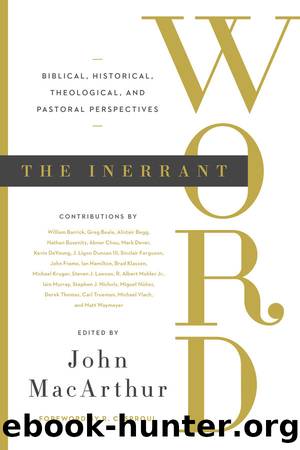The Inerrant Word by John MacArthur

Author:John MacArthur
Language: eng
Format: epub
Publisher: Crossway
If one were to have asked Hosea if he believed that God was sovereign over history and that God had designed the first exodus from Egypt as a historical pattern that foreshadowed a second exodus from Egypt, would he not likely have answered yes? At least, this appears to be the way Matthew understood Hosea, especially using the language of the first exodus from Hosea 11:1 in the light of the broader and particularly the immediate context, especially of Hosea 11,21 where a “return to Egypt” is predicted (v. 5), and where the main point and goal is the end-time exodus from Egypt (v. 11). What better language to use for Hosea’s prophecy of the second exodus and the beginning of its fulfillment in Jesus than the language already at hand describing the first exodus? This is a short step away from saying that the first exodus was seen by Hosea and, more clearly, by Matthew as a historical pattern pointing to the reoccurrence of the same pattern later in Israel’s history. In this respect, Matthew’s use of Hosea 11:1 may also be called “typological” in that he understood, in light of the entire chapter 11 of Hosea, that the first exodus mentioned in verse 1 initiated a historical process of sin and judgment to be culminated in another final exodus (vv. 10–11). After writing the above, I found that Duane Garrett has said:
We need look no further than Hosea 11 to understand that Hosea, too, believed that God followed patterns in working with his people. Here the slavery in Egypt is the pattern for a second period of enslavement in an alien land (v. 5), and the exodus from Egypt is the type for a new exodus (vv. 10–11). Thus the application of typological principles to Hos 11:1 [by Matthew] is in keeping with the nature of prophecy itself and with Hosea’s own method.22
Many commentators have observed that the placement of the quotation of Hosea 11:1 in Matthew 2:15 appears to be out of order, since the quotation is appended directly only to the report of Joseph, Mary, and Jesus going to Egypt and not coming out of Egypt. Rather, they are said to come out of Egypt only later in 2:21. Accordingly, a number of commentators have noted that the quotation would seem to have been better placed directly after Matthew 2:21, where it says that the holy family returned from Egypt and “came into the land of Israel.” Those who acknowledge the odd placement in 2:15 explain it to be an anticipation of the return from Egypt narrated in the following context.23 That this, in fact, is partly the case is evident from noticing that the beginning of 2:15 mentions that the holy family “was there until the death of Herod.” This clearly anticipates verses 20–21, which narrate the return of Joseph and his family in inextricable connection to the death of Herod. Others contend that the quotation could not have been put after verse 21 because
Download
This site does not store any files on its server. We only index and link to content provided by other sites. Please contact the content providers to delete copyright contents if any and email us, we'll remove relevant links or contents immediately.
What Is the Gospel? (Foreword by D. A. Carson) by Greg Gilbert(990)
Jesus in Me by Anne Graham Lotz(970)
Daily Strength: Devotions for Bible Believing Study by Douglas Stauffer & Andrew Ray & Rick Quatro(900)
Christian Ethics by Wilkens Steve;(860)
The Practice Is the Path by Tias Little(824)
New Morning Mercies by Tripp Paul David(809)
Cleaning Up Your Mental Mess by Dr. Caroline Leaf(741)
Veritas: A Harvard Professor, a Con Man and the Gospel of Jesus's Wife by Ariel Sabar(735)
Greatest Mystery in the World by Og Mandino(668)
The Creative Call by Janice Elsheimer(603)
No More Christian Nice Guy by Paul Coughlin(590)
Our Appointment with Life by Thich Nhat Hanh(575)
Monastic Archaeology by Unknown(568)
2084 by John C. Lennox(559)
This One Wild and Precious Life by Sarah Wilson(545)
Jesus--Awesome Power, Awesome Love (Discover 4 Yourself® Inductive Bible Studies for Kids) by Kay Arthur(535)
The Catholic Verses: 95 Bible Passages That Confound Protestants by Dave Armstrong(528)
The Duties of Parents by J.C. Ryle(519)
The Tale of the Tardy Oxcart (Swindoll Leadership Library) by Swindoll Charles R(507)
